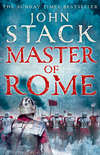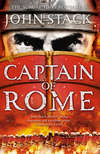Kitabı oku: «Master of Rome»
Masters of the Sea
Master of Rome
John Stack

Dedication
For Adrienne
Contents
Cover
Title Page
Dedication
Tunis, North Africa. 255 BC
Chapter One
The searing wind swept through the streets of Aspis and…
Chapter Two
Marcus Aemilius Paullus strode purposefully across the main deck of…
Chapter Three
Atticus sat in the stern of the skiff as it…
Chapter Four
Gaius Duilius sat motionless as the princeps senatus, the leader…
Chapter Five
Atticus stood on the foredeck of the Orcus as the…
Chapter Six
Lentulus, the master shipbuilder, stroked the threadlike grey hairs of…
Chapter Seven
Regulus walked slowly across the main deck of the Alissar,…
Chapter Eight
The quinquereme moved steadily through the crowded sea-lane, its course…
Chapter Nine
A single alarm bell was heard across the wide sweep…
Chapter Ten
Hamilcar watched impatiently as the small bird circled the tower,…
Chapter Eleven
Calix glanced at the wind-driven ripples across the surface of…
Chapter Twelve
The sentry pulled the rim of his helmet lower as…
Chapter Thirteen
Hamilcar looked out along the length of the city of…
Chapter Fourteen
The day dawned under a leaden sky, prolonging the long…
Chapter Fifteen
Baro looked anxiously beyond the wake of the Orcus as…
Chapter Sixteen
The crowd surged forward, straining against the line of legionaries…
Chapter Seventeen
The trading ship moved steadily over the dark sea, its…
Chapter Eighteen
Hamilcar looked up at the verdant slopes of the mountain…
Epilogue
The chariots moved slowly through the petal-filled air, the horses…
Historical Note
Acknowledgements
About the Author
Other Books by John Stack
Credits
Copyright
About the Publisher
TUNIS, NORTH AFRICA. 255 BC
The colossal animal surged forward against the crack of the bullwhip, its momentum increasing into an unstoppable charge as it bellowed in anger and terror, the scent of men fuelling its rage. It lifted its head and gazed ahead through hooded yellow eyes. The scene before it was a blur of movement, a dark horde that threw up a terrifying wall of sound; the hammering of ten thousand shields, the war cries of a multitude. The elephant bellowed once more, sweeping its scimitar-shaped tusks high into the air as the whip cracked against its hide.
The ground beneath the beast trembled and shook. Dust smothered its throat, the thirst maddening, while slowly the host before the creature drifted into focus, the mass into individual men. A sharp pain shot through the elephant’s flank and it immediately turned its head to the site of injury, the blood stark against the grey hide. Every instinct called for flight, but years of brutal training demanded obedience and the bullwhip drove the creature on.
The elephant crashed headlong into a wall of shields and the war cries of men changed to screams of pain, the momentum of the creature’s charge driving it deep into the Roman maniples. The legionaries struck out with shield and sword while overhead volleys of spears rained down to strike deep into exposed flesh, the unceasing pain driving the elephant into frenzied terror. The creature swept its tusks before it, scything through the massed ranks, cutting through flesh and armour. It raised its trunk, a spray of pink blood gushing forth from the fluid filling its punctured lungs, while its feet crashed down on the fallen, crushing bone and cartilage as the death cries of man and beast filled the air.
The Roman line buckled and caved before the momentum of the elephant charge was absorbed and then slowly repelled, the strength of twelve thousand legionaries pitted against the might of a hundred elephants. The front ranks shattered but fought on, the inescapable fight driving them to mindless courage, with men standing their ground against creatures that killed and maimed relentlessly until the burden of countless wounds drove them to their knees. Those who remained advanced against the Carthaginian phalanx that shadowed the elephant attack, but again the Romans were checked as cries of alarm swept across their lines.
The Carthaginian horse, four thousand strong, raced across the open ground, the routed Roman cavalry in their wake, the light-horsemen loosing spears at full gallop into the exposed Roman right flank. The maniples turned to engage. The centre became a confusion of commands and alarm as the enemy cavalry swept around the rear of the Roman formation. The legions ceased to advance, the fight on all sides. The order to ‘steady the line’ was given, a desperate command to stand fast, to take strength and fight against all odds.
The Carthaginians pressed inward, the cavalry driving their mounts ever on against upturned shields, the riders striking down with spear and sword. The maniples stepped back, the fallen trampled under hoof as legionaries struggled to wield their swords in the crush, the men to their rear unable to assist as the battle descended into butchery. In the centre, desperate commanders roared hopeless orders, the ever-tightening vice robbing them of the chance to break out while the battle line closed in from all sides, the Carthaginians advancing relentlessly, giving no quarter, their hatred for the Roman invader feeding their strength and determination as warriors pushed forward to fight in the front line, eager to bloody their swords, the pressure on the Roman lines never abating until the last man fell under Phoenician steel.
CHAPTER ONE
The searing wind swept through the streets of Aspis and beyond to the harbour, the parched air whipping the wave crests of the gentle swell into a fine spray, as if greedily clawing at the water after its five-hundred-mile trek across the arid Sahara. Atticus stepped out from the lee of a building into the flow of air and turned his face into the wind, breathing in deeply, sensing the enormity of the mysterious land in darkness before him, the hostile territory of the Carthaginians that pressed against the boundaries of the Roman-held port. He spotted the man he had searched for at the end of the street, and approached, the centurion turning to acknowledge him.
‘Cursed wind,’ he said.
Atticus nodded. ‘The Sirocco,’ he replied, remembering his grandfather’s teaching, and how that same wind shrouded his home city of Locri on the south coast of Italy with oppressive humidity every spring. ‘Any sign?’ he asked.
‘None,’ Septimus replied, and the two men lapsed once more into silence as the predawn light began to illuminate the landscape before them.
The land along the coast was green and fertile, stretching east a thousand leagues to Egyptus and west to the Pillars of Hercules. For forty generations it had been home to the Carthaginians, protected along its length by a mighty fleet that controlled the trading routes of the southern Mediterranean; until a year before, when the Romans humbled the Carthaginian navy at Cape Ecnomus, and thereafter invaded the once inviolate shores of North Africa. Now, not fifty miles to the west, the Roman army, fifteen thousand strong, were engaged with the Carthaginians near Tunis while the men at Aspis, Atticus and Septimus amongst them, waited impatiently for news.
Atticus looked to the eastern sky, watching slowly as the crimson skyline dissolved at the approach of the sun, the orb finally cresting the horizon with a spear of white light that flashed across the blue-grey sky. He looked over his shoulder and turned to walk back down the deserted street to the harbour. He paused at the water’s edge, his gaze ranging over the forty galleys tugging gently on their anchor lines near the shore. As a praefectus classis, a prefect of the fleet, these ships were under his command, and his own galley, the quinquereme Orcus, was moored in the centre of the formation. Atticus studied the fleet with a practised eye, watching as men moved slowly on the decks without command, the routine of naval life dictating their actions, the only sound the howling wind that masked all others.
Atticus had come ashore an hour before, succumbing to a sudden compulsion to escape the confines of the Orcus, anxious to learn if any messenger had arrived during the night. It was an escape he had never sought from his previous ship, the Aquila, and he wondered if there would ever come a time when he would consider the Orcus as anything more than just another ship of the Classis Romanus, the fleet of Rome.
He turned once more to the figure standing at the end of the street, the centurion’s tall stature imposing even from fifty yards. Septimus was motionless, standing resolutely in the face of the wind, his attention still fully drawn to the far southern horizon. Atticus began to walk back towards him. He glanced left and right down the narrow laneways as he walked, briefly spying individual or small groups of legionaries, the men emerging slowly from the homes that had been commandeered to house them, just ahead of the clarion call of the vigilae, the night guardsmen ending their watch by rousing the camp. He looked once more to Septimus and immediately noticed the tension in the centurion’s shoulders, his body leaning forward at the waist. Atticus quickened his pace but, before he could cover the distance, Septimus swept his sword from his scabbard, the metallic sound caught and whipped away by the wind. The centurion turned, his eyes seeing beyond Atticus to the street behind.
‘To arms!’ he shouted. ‘Sound the alarm!’
‘What is it?’ Atticus asked, and Septimus indicated over his shoulder to the horizon beyond.
‘Drusus!’ the centurion roared, searching amongst the soldiers that were appearing from every street. He spotted him within a second, the optio pushing his way through to the front of the gathering force, his ever-stern expression hiding his surprise at the sudden call to arms.
‘Drusus, get to the officers’ quarters. Inform the centurions I want them to form a battle line from this central point.’
The optio saluted, hammering his fist into his chest plate and turned to push his way back along the street. Septimus was fundamentally of the same rank as every other marine centurion of the fleet; but, given his experience and his position as centurion of the Orcus, the prefect’s command ship, the other officers readily deferred to his orders. Within a minute the soldiers were forming on his position.
Septimus stood by Atticus as the prefect looked to the southern horizon.
‘How many do you think there are?’ Atticus asked.
‘Hard to be sure,’ Septimus replied. ‘Over a thousand at least.’
Atticus nodded, concurring with the estimate. He turned and grabbed a legionary from the throng behind him. ‘Get back to the Orcus and have my second-in-command report here,’ he ordered and the soldier was away.
Septimus stepped out from the confines of the street on to the flat expanse of beaten earth at the rear of the town. The soldiers surged out behind him and began to form into disciplined maniples, the shouted commands of centurions and optiones filling the air as the ranks were formed and the battle line was drawn. The manoeuvre was repeated along the length of the town, the men keeping their helmet-covered heads slightly lowered in the face of the wind. The entire marine complement of the fleet was ashore, sixty men for each galley, legionaries all, and the line was dressed to form a shield wall over two thousand strong.
‘Something’s wrong,’ Septimus muttered, his eyes focused on the approaching force. ‘They’re not formed into ranks.’
‘I see it,’ Atticus replied, noting the disorganized approach, so dissimilar to the serried ranks of the legionaries.
‘Prefect,’ Atticus heard, and he turned to see his second-in-command beside him. ‘Baro,’ Atticus began. ‘Ready the squadron for battle and station two galleys in the outer harbour.’
‘Yes, Prefect,’ Baro replied, and took off at a run.
‘Thermae,’ Atticus said by way of explanation, and Septimus nodded, remembering the simultaneous land and sea attacks the Carthaginians had employed there.
The minutes drew out slowly as the approaching force wheeled towards Aspis, its formation still chaotic, the cloud of dust raised by their feet whipping towards the town on the constant wind.
‘Two thousand,’ Septimus muttered as the decreasing distance increased his estimate, his eyes constantly checking the eastern and western approaches for additional forces, but finding none. He glanced down the line and saw many of the men inch forward, the anticipation of battle wrestling with ingrained discipline.
‘Steady, boys,’ he roared, and the shout was taken up by the other centurions, the legionaries redressing the line until it became firm once more.
Atticus glanced over his shoulder, seeing past the ranks and down the street to the sliver of harbour in view, watching as one galley then another passed through his field of vision, the wind robbing him of the sound of shouted orders only a hundred yards away. He looked to his front again, the approaching force now less than six hundred yards away, the horizon behind them clear. The sight puzzled Atticus, but he cast his questions aside, making ready to turn his back and return to the Orcus. The legionaries were more than a match for the disorganized men approaching and Atticus was anxious to return to his galley and take command of the fleet. He turned to the centurion.
‘Septimus, I’m returning to the Orcus. I’ll station two signal men on the shore to keep—’
‘They’re velites!’ a shout went up, and the men began to mutter as they looked to confirm the report.
‘Silence in the ranks!’ Septimus roared. He held a hand out to the left side of his face to shield his eyes from the glare of the sun, trying to single out individual men.
‘I don’t believe …’ he whispered after a moment. ‘They are velites, light infantry. They’re our own men.’
‘This could be a trick,’ Atticus said, the memory of Thermae still fresh.
Septimus nodded. ‘Ready pila!’ he shouted, and the hastati, the junior soldiers, raised their spears.
The men approaching were shouting, their voices borne on the wind sweeping over the Roman line, their words interlaced into a confusion of sound, until one command carried above the rest, ‘Hold! Do not loose,’ and many of the hastati began to lower their spears.
‘Stand ready!’ Septimus roared, not daring to relinquish the advantage until he was sure, the sight of the Roman uniforms in conflict with his caution.
The men swept on but slowed as they narrowed the distance, wary of the inflexible line of shields facing them, the spear tips visible above the ranks, ready to strike forward. Eventually the advance petered out, the men forming into a ragged line a hundred yards short of the shield wall.
Atticus stepped forward from the Roman line. ‘Who commands there?’ he shouted across, and a soldier stepped forward, his hand held away from the hilt of his sword. His uniform was dust-stained and his face was creased with fatigue, but he held himself tall and he crossed the gap quickly to stand before Atticus and Septimus.
‘I am Servius Salinator,’ he said, ‘commander of the Etruscan infantry.’
‘Atticus Milonius Perennis, prefect of the fleet, and this is Septimus Laetonius Capito, centurion of the Orcus.’
The man saluted Atticus and nodded to Septimus.
‘You are part of the proconsul’s army,’ Atticus said, and Salinator nodded, his expression strained. ‘Then where are the legions?’ Atticus continued. ‘And why do you march out of formation?’
‘The Sixth and Ninth legions are no more,’ Salinator said, his voice laced with anger and shock. ‘They have been defeated, near Tunis.’
‘By the gods …’ Septimus whispered, his thoughts immediately on the men of the Ninth, the legion he had served with for so many years.
Atticus stepped forward, his mind reeling as he grabbed Salinator’s arm. ‘Come with me,’ he said, and he led him through the shield wall, leaving Septimus standing alone. The centurion gathered his wits and turned to his men. ‘Stand down the line!’ he shouted, and the order was repeated, prompting the Etruscans to move forward once more.
Septimus quickly followed Salinator as Atticus led him to the officers’ quarters overlooking the harbour. The building was deserted and the three men stepped out of the warm breeze into the cool, dark interior, Atticus’s eyes never leaving Salinator as they settled around a table. ‘What happened?’ he asked.
The Etruscan drew the back of his hand across his mouth. ‘We met the enemy on a plain south of Tunis two days ago,’ he began, his eyes, unseeing, fixed on the rough grain of the table. ‘The Carthaginians attacked first, in the centre, with elephants, at least a hundred of the infernal beasts, charging in front of their infantry.’ Salinator shook his head, ‘The legions … they just stood their ground, to a man. It was the most …’ He trailed off and Septimus straightened his back as he thought of the incredible courage.
‘We were on the left flank, facing the enemy’s mercenaries,’ Salinator continued, his face showing the disdain he felt for the hired soldiers, ‘and the cavalry was on the right. We broke through easily but the cavalry were routed. They were outnumbered, four, maybe five to one. They never stood a chance.’
‘And the centre?’ Atticus asked.
‘After our horse fled, the Carthaginian cavalry attacked the right flank and swept around the rear. Some of the hastati broke through the elephant charge, but they were swallowed by the enemy infantry, and the bulk of the legions were trapped by the cavalry. We re-engaged on the right and the proconsul broke out with maybe five hundred men, but they were isolated and surrounded again and we were pushed back, so I ordered a fighting retreat.’
‘You fled and left the legions trapped?’ Septimus said, rising to his feet, his fists balled by his side.
‘There was nothing we could do,’ Salinator replied, standing to face down Septimus. ‘If we’d stood our ground we would have been slaughtered like the legions.’
‘So you ran,’ Septimus said contemptuously, ‘and saved your own skin.’
‘Enough!’ Atticus shouted, and stood to lean between the two soldiers. He turned to Salinator. ‘Did you see the proconsul fall?’ he asked.
The Etruscan tore his eyes from Septimus and looked to Atticus, the anger in his eyes never abating. ‘No,’ he replied after a moment. ‘I think he was captured but I can’t be sure.’
‘What does it matter?’ Septimus said, turning away from the table, concern for the Ninth overwhelming him.
‘Were you pursued?’ Atticus asked.
‘I don’t think so,’ Salinator replied and, looking at Atticus, he spoke aloud a thought that had plagued him during his flight from the battle. ‘But with the legions destroyed, nothing stands between Tunis and here.’
Atticus nodded and walked from the table. Salinator sat down again, his gaze moving to Septimus, his mouth creased in anger once more.
Suddenly a clarion call of alarm sounded, followed by another and then another, until they overlapped to form a continuous sound.
Salinator shot up once more, panic in his face. ‘We were followed; the Carthaginians are attacking.’
‘No,’ Atticus said, his expression equally dread-filled, but for another reason. ‘Those are naval horns.’ He rushed to the door, pushing it open to run outside, his eyes blinking rapidly in the sunlight after the gloom of the interior. His gaze swept the seaward horizon. He felt Septimus come out to stand beside him, but his focus never left the fearsome sight that had prompted the sound of alarm from the galleys of the fleet. Atticus instinctively reached for the hilt of his sword.
‘Poseidon protect us …’ he whispered, and he broke into a run as he headed down to the shoreline, calling to the nearest galley to launch its skiff. In the distance, the dark-hulled Carthaginian galleys continued to deploy across the mouth of the harbour, their number already exceeding a hundred, the windblown waves dashing against their rams as their oars crashed endlessly into the restless sea.
Marcus Atilius Regulus straightened his back as he heard footsteps approaching the door, the proconsul drawing himself to his full height in the darkened, airless room. He stepped into one of the shafts of sunlight permitted by the shuttered window, feeling the sweat roll down his back in the infernal heat. He blinked a bead of moisture from his eye. Regulus was nearing fifty years old but his body was that of a younger man, the harsh campaigning of the previous twelve months having stripped his frame of the softness that had accumulated over many comfortable years in the Roman Senate.
He was thirsty, the meagre amphora of brackish water he had been given the night before long since gone, and he licked his lips to moisten them, conscious that his first words should not be spoken with a cracked voice. He watched the door shudder as a harsh metallic sound cut through the near silence; the room was flooded with harsh sunlight as the door was opened. Regulus squinted against the light but he resisted the urge to wipe the blindness from his eyes, instead staring directly ahead to the two figures facing him. They were both soldiers, but senior in rank, their bearing revealing the arrogance and confidence of command.
The younger man entered first. He was Carthaginian, his uniform of the style that Regulus had come to loathe over the previous months. He looked the proconsul in the eye, staring at him as if in fascination, studying him, and Regulus returned the gaze, suddenly conscious of the soiled, sweat-stained tunic he was wearing. The other man stepped in. He was taller than the Carthaginian, his skin a paler complexion, and his gaze wandered the room before settling on the Roman, a half-smile of disdain creasing the edge of his mouth.
‘You are Regulus,’ the Carthaginian said; more a statement than a question, but the proconsul nodded in reply regardless.
‘I am Hamilcar Barca,’ the Carthaginian continued. ‘And this is Xanthippus.’
Regulus held his tongue, taking the moment of silence to study the men anew. He had heard their names many times over the course of the year-long campaign – from ally and captured foe alike. Hamilcar Barca was the overall commander of the Carthaginian forces, and Xanthippus, the Spartan mercenary, hired to command their army after their overwhelming defeat at Adys over a year ago, the man who had given the enemy victory only two days before at Tunis.
‘What of my men?’ Regulus asked, speaking for the first time, his voice low and hard in an effort to instil authority in his question.
‘Sit down,’ Hamilcar replied, indicating the single chair against the far wall.
Regulus glanced over his shoulder but remained standing. He stared into the Carthaginian’s face, keeping his expression unreadable. Hamilcar stepped forward.
‘Sit down,’ he repeated menacingly. ‘Or I will have my men come in and strap you to the chair.’
Regulus hesitated a second longer and then moved slowly to the far wall, sitting down in one fluid movement as if by choice.
Hamilcar smiled, although the gesture did not reach his eyes. ‘For now your men are in the prison beneath this fortress,’ he replied, his eyes never leaving those of the proconsul’s. ‘I have not yet decided their fate.’
‘They are soldiers captured in battle,’ Regulus said, leaning forward. ‘Their lives must be spared.’
‘They are Roman,’ Hamilcar shot back. ‘And their lives are forfeit to the whim of Carthage.’
Regulus made to retort but again he held his tongue, sensing that to antagonize the Carthaginian further was to risk the lives of the five hundred legionaries who had been captured with him. He repeated the number in his mind. Five hundred out of an army of twelve thousand. He whispered a prayer to Mars, the god of war, as he struggled to keep the burden of the terrible loss hidden from his enemy.
‘You are defeated, Roman,’ Hamilcar said, as if reading Regulus’s thoughts. ‘Your army is no more and your invasion is finished.’
‘Is that why you have come here, Carthaginian?’ Regulus retorted. ‘To tell me this. To mock me?’
‘No,’ Hamilcar replied, stepping forward once more until he stood over Regulus. ‘Your light infantry escaped our grasp at Tunis and have fled to Aspis. I have come here to demand you order those forces to surrender.’
‘Surrender?’ Regulus scoffed. ‘The fleet at Aspis will already have evacuated them. There will be no surrender.’
‘You are wrong, Roman,’ Hamilcar replied, the arrogance of the proconsul stirring his anger. ‘The port is blockaded and your fleet is trapped, and if you do not order those men to surrender, I will kill every last one of them.’
Regulus was stunned into silence, his mind racing to devise an alternative.
‘You have until tomorrow to decide,’ Hamilcar said, and he turned and left the room, Xanthippus following without a backward glance.
Regulus stood up as the door was closed, the room once more plunging into semi-darkness. He breathed in deeply, trying to clear his thoughts, but the warm air caught in his throat and he coughed violently. He reached out instinctively for the amphora and picked it up, remembering immediately that it was empty, and he threw it at the wall in anger, the clay shattering into a dozen pieces.
Over a year ago he had sailed south in triumph from Cape Ecnomus. He had met the Carthaginian army at Adys and swept them aside, had taken Tunis without a fight and had plundered the land around Carthage. The war was won, the enemy beaten on all fronts and, conscious that his consulship was nearing its end and that a successor could arrive any day from Rome to steal his victory, he had confidently sent envoys to Carthage with his terms for their surrender: abandon Sicily, disband the navy and admit total defeat.
Even now Regulus remembered the anger he had felt when the Carthaginians refused his terms. Thereafter he had spent every waking hour preparing his army for the moment the enemy would dare to step outside the city. They had emerged, a new leader at their head, and Regulus had marched on to the plains south of Tunis, ready to deliver the fatal blow that would finally subdue the Carthaginians.
But that victory had been snatched from him, replaced with ignominious defeat, and Regulus cursed Fortuna for the ruination of his fate. He strode to the shuttered window and squinted through a crack in the timber to gaze at the city of Tunis spread out before him. In the distance, a dark pall of smoke rose from the plain, the funeral pyre of the battlefield, and Regulus whispered a prayer once more for the lives of twelve thousand men.
‘We should attack now,’ Xanthippus said as he followed Hamilcar across the battlements, ‘before the enemy becomes entrenched.’
‘No, I cannot risk the destruction of the Roman fleet. I need those galleys intact. We will wait,’ Hamilcar replied, turning to look out from the heights of the fortress over the city of Tunis, the late evening sunlight reflecting off the taller buildings. His gaze settled on the pillar of smoke to the south, its tentacles reaching towards the city, borne on by the eternal wind, the ghibli. The fires had been burning since dawn the day before, when Hamilcar had witnessed the lighting of the pyres under the Carthaginian slain, their bodies ceremoniously committed to Mot, the god of death, while nearby the Roman carrion were put to the torch, a separate fire to which Hamilcar had added ten more bodies – those of the members of the council of Tunis who had opened the gates of the city to the Romans.
‘You think this Roman will order his men to surrender?’ Xanthippus asked, following the Carthaginian’s gaze.
‘Regulus will comply,’ Hamilcar said with certainty. ‘He knows their situation is hopeless.’
‘Then surely those men know it too,’ Xanthippus replied. ‘Perhaps they have already surrendered.’
Hamilcar turned to the Spartan, a smile on his face. ‘They have not surrendered,’ he said. ‘Nor will they under force of arms.’
‘You are sure?’ Xanthippus said.
Hamilcar nodded. ‘I am sure,’ he replied. ‘For I know the resolve of the man who commands there.’
Over the previous year, Hamilcar had been determined to discover the identity of the lone captain who had frustrated his attack at Ecnomus. Learning that he had survived and had been promoted for his actions, Hamilcar had burned the man’s name into his mind, searching for it in every spy’s report that crossed his desk, tracking his movements during the course of the campaign, waiting for an opportunity to avenge his defeat at Ecnomus.
‘Who is this Roman?’ Xanthippus asked, seeing the expression of hostility on the Carthaginian’s face.
‘He is not Roman, he is Greek, like you,’ Hamilcar said, the words spoken slowly as the strength of his conviction coursed through him. ‘And when I have Regulus’s order, I will deliver it to this man and accept his surrender personally.’
Hamilcar turned from Xanthippus and looked to the east, the horizon rapidly slipping into darkness as the sun fell away in the west. In his mind’s eye he pictured the port of Aspis and the enemy within, his mouth forming the name of his foe. Perennis.
Atticus ran his hand along the forerail of the Orcus as he stared out across the thousand yards to the Carthaginian blockade, the two hundred dark-hulled quinqueremes slowly taking shape in the dawn light. He looked to the galleys of his command, each one with its bow facing the mouth of the harbour, the outgoing tide stretching their stern anchor lines behind them as if the ships themselves were eager to be let loose on the enemy after four days of silently watching the Carthaginian galleys.




